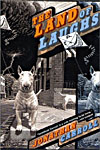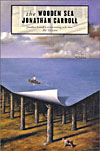
Comment
on this story
|
 |

You might not know him, but you should
by Adrienne Martini
You probably haven't heard of Jonathan Carroll, much less read his stuff, even though he has been publishing for 20-plus years and has a dozen or so books under his belt. He does have a small, cult-like following among folks who go out of their way to find unique, vibrant literature and his fan base includes other writers like Jonathan Lethem, Stephen King, and Neil Gaiman. But Joe or Jane Reader isn't familiar with Carroll's remarkably accessible works. Part of the problem is that no one quite knows which shelf he goes on. Horror? Dark fantasy? Does he belong with Gabriel Garcia Marquez? Or with Dean Koontz? You can see the dilemma that modern booksellers face. Invariably, his books get shoved into science fiction, which is where all of the hard to categorize books end up, the bookstore equivalent of the Purgatory.
If you know nothing else about the man, you must admit that he writes a killer title: A Child Across the Sky. Kissing the Beehive. The Panic Hand. Sleeping in Flame. The Land of Laughs. The Wooden Sea—the last two have been recently released by science fiction/fantasy publisher Tor books, a house that searches out speculative fiction that is of the more literary sort, with less emphasis on buxom alien babes and more on the writer's skill with language.
Laughs ($13.95) is, actually, a reissue of the 1980 edition, which has been long out of print and much in demand. Despite the 20-year gap from when these words first saw print and now, Laughs still feels immediate, fresh, and inventive, which is strange given how many times since this book was first published that the same trope it investigates has found its way into print, if written by different authors.

In Laughs, Thomas Abbey, a schoolteacher and son of a famous Hollywood actor, sets out to write a biography of his favorite children's book author, Marshall France. Abbey and his deeply odd girlfriend Saxony light out for a small town in Missouri, former home of the now-dead France. Once there, they discover that France may have been a much better writer than they once dreamed and that [insert big, booming voice here] all is not well in this average mid-American town.
What is new—even now, even 20 years ago—is the care with which Carroll adds layers to this seemingly simple story. Abbey is not simply in search of the remaining traces of the man who wrote his favorite childhood stories; instead he is looking for something much deeper that will redeem him from his own childhood, his absentee famous father and his own discomfort with the limelight. Does he find it? Well, yes. And, emphatically, no.
Analyzing Carroll's plots is an exercise in onion peeling—for each layer you mentally resolve, there is still another slice to parse—but his words themselves are clean and effortless. It's a book you could breeze through in an evening. Carroll makes it look easy to construct clear fiction, something that is devilishly hard to do.
With The Wooden Sea ($23.95), Carroll's latest novel, which has a gorgeous Rafal Olbinski cover illustration, you can actually see how difficult clear fiction can be. Which isn't to say that Sea is a bad book—it's still twice as fun and thought-provoking as most of the books on the NYT bestseller lists—but that you can see the fault lines running through the 300-odd pages. The fictional tectonic plates just didn't quite line up well enough on this one and the strain starts to show.

It is still an interesting story, despite the weaknesses in its telling. Small town cop Frannie McCabe (who also makes an appearance in Kissing the Beehive) finds a dog that looks as if he's been through several kinds of hell and back. Despite his wife's protest, McCabe adopts the dog. The relationship is short-lived, however, when the terrier dies. McCabe buries him. And the dog comes back.
But this isn't Pet Semetary redux. While there is a similar theme of pet resurrection, Sea is about more than simply being haunted by a dead animal. Plotwise, McCabe is in for the adventure of his life, full of visitations from younger versions of himself, a chase across time in search of the meaning of it all, and a visitation or two from what appear to be Heavenly beings (which actually aren't, but to tell you where they really come from would be to spoil a pretty big surprise.)
In terms of theme, though, Sea is even more ambitious than its mile-a-minute plot, and that may be where the whole thing starts to come apart. Instead of a dogged focus on one idea—like Laughs' devotion to examining the relationship between parent and offspring—Sea tries to take on mortality and aging and fathers and daughters and redemption. The result, while still a rollicking good read, lacks the precision that characterizes Carroll's earlier books.

May 24, 2001 * Vol. 11, No. 21
© 2001 Metro Pulse
|